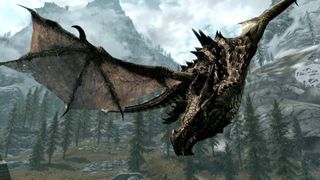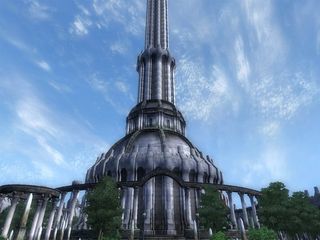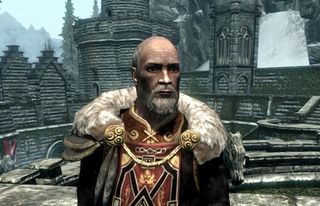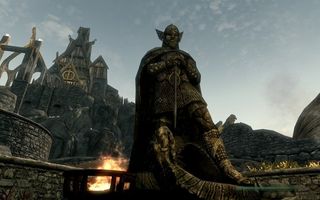Meanwhile, the Thalmor backed a coup of the Bosmer (aka wood elf) home of Valenwood. Empire forces and loyalist wood elves were defeated, and Valenwood fell. The Thalmor named their territory the Aldmeri Dominion, after the pre-Empire elven nation.
So, the end result of the first 50 years after Oblivion was a weakened Empire and a powerful, independent nation of scheming jerk elves. That set the stage for The Great War, the aftershocks of which defined the world of Skyrim.
- How to install Skyrim Special Edition mods on PS4 and Xbox One
- You think you’ve completed Skyrim, but have you found these 5 hidden bosses?
- The Elder Scrolls 5: Skyrim Special Edition Alchemy guide - Quick levelling walkthrough

In 4E171, An Aldmeri ambassador rolled up to the Imperial City with a covered wagon and a list of demands for Emperor Titus Mede II. The Empire was to cede large chunks of Hammerfell, disband the Blades, and stop worshipping Talos. (Talos is the first emperor, Tiber Septim, who allegedly ascended to godhood. He had steamrolled the old Aldmeri Dominion with a borrowed dwarven weapon of mass destruction, and the Thalmor weren't fans.)
Emperor Titus II refused, and the ambassador dumped the contents of the cart. It was the heads of every Blades agent spying in the Aldmeri Dominion. The war was on.
The Aldmeri invaded Hammerfell and Cyrodiil, and over several years, they advanced until the Imperial City itself was surrounded. Titus II's army fought its way out of the city to link up with reinforcements from Skyrim, and the elves sacked the Imperial capital. The palace was burned and the White Gold Tower, the most recognizable landmark in Oblivion, was looted.

The Thalmor thought they had won the war, and Titus II encouraged them to think that, all while planning a counterattack. The attack, called The Battle of the Red Ring, took the elven forces by surprise and completely crushed them, thanks in no small part to Nord reinforcements from Skyrim. The Imperial City was in the hands of Imperials again.
Even though the Aldmer forces in Cyrodiil were destroyed, the Imperial armies were in no shape to continue fighting. Titus II took advantage of the victory to negotiate a peace treaty.
Sign up to the GamesRadar+ Newsletter
Weekly digests, tales from the communities you love, and more
The White-Gold Concordat, negotiated at the namesake tower, didn't seem great for the Empire. It disbanded the Blades, ceded occupied Hammerfell to the Aldmeri, and outlawed the worship of Talos. In short, it was everything the Aldmeri ambassador had asked for before he redecorated the throne room with Blade noggins.

Titus II believed that granting these terms after fighting to a standstill was better than having just given in in the first place. Giving in would have meant a civil war in the Empire, but at the time of the treaty, all the territories wanted an end to the fighting.
Still, the Concordat left territories like Hammerfell and Skyrim feeling betrayed. The Redguards of Hammerfell rejected the treaty and fought the Aldmeri Dominion for five more years, eventually driving them out and making a second peace treaty necessary.
Many Nords were outraged at the outlawing of Talos worship. Tiber Septim was a Nord, and the cult of the first emperor was popular in Skyrim. Many soldiers from Skyrim died to retake the Imperial City, and the White-Gold Concordat seemed like a betrayal. The Nine Divines may have officially become the Eight Divines in the Empire, but many Nords kept the faith. (Also, if you pray to Talos, all your diseases are cured. So there's that.)

So, at the beginning of Skyrim, the Aldmeri are taking the long view, waiting for the Empire to weaken and fall apart from within. The Empire is biding its time, trying to recover its strength so it can oppose the Aldmeri. Many Nords think the Empire is no longer strong enough to protect Skyrim. A Jarl by the name of Ulfric Stormcloak has just paid a visit to the high king, and a certain prisoner is on his way to be executed...
Any prejudice against elves is the view of the author alone. Any discrepancies in the timeline are a result of warps in reality.
Most Popular



